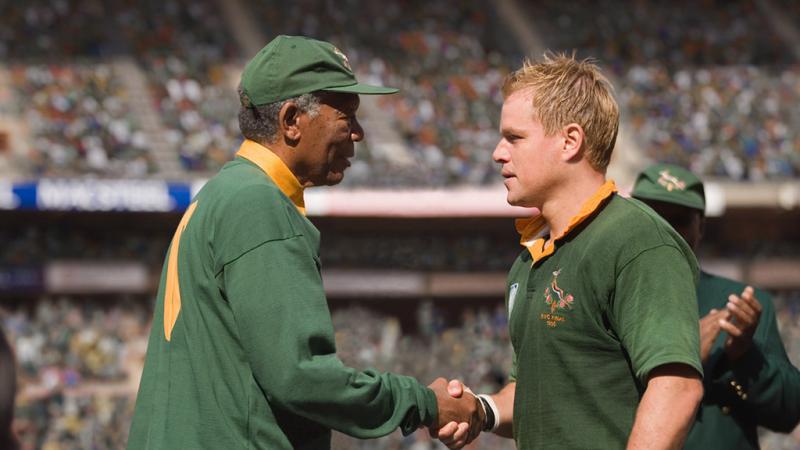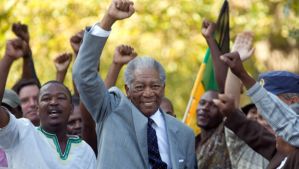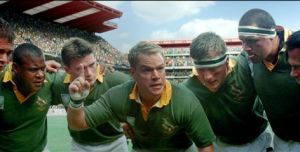Invictus | reviews, news & interviews
Invictus
Invictus
The captain of South Africa's soul gets the Hollywood treatment

There is a problem with Nelson Mandela. He is, it is universally agreed, a remarkable man. His profound humanity is undoubted. He is on first-name terms with saintliness. When eventually he shuffles off his mortal coil, every newspaper on the planet will hold the front page. The problem comes when you stick him in a drama. Drama calls for its characters to go on a journey, to be visited by doubts, to overcome demons, to keep an audience guessing.
Not that that stops them. He has cropped up in previous dramas, but Invictus is Mandela’s third manifestation as a screen character within the last year. On British television he has recently been played by Clarke Peters in Channel 4’s Endgame, about the secret negotiations to end apartheid, and last week’s Mrs Mandela on BBC Four, in which David Harewood played the fiery young activist. And now here comes Morgan Freeman, a southern American who was maybe not born to play South African’s first black president but, if Hollywood ever got round to South Africa's long walk to freedom, was certainly destined to.
 How Freeman (pictured right as Mandela) landed the part in the film version of John Carlin’s book Playing the Enemy is a bit of a saga in itself. But does the book itself merit the big cinematic treatment? In recent films director Clint Eastwood has been busy examining national identity and the larger meaning of sport. Here he gets to marry both themes in the story of how Mandela plotted to unite a divided nation through rugby. A spoiler alert won’t be necessary at this point. If you know the story you know the story. If you don’t, you’ll already know it by about five minutes in. Mandela has just been elected president, and the Afrikaaners are terrified the ANC will mete out vengeful punishment for all those years of white supremacist brutality. Indeed that’s what is expected of him. He chooses instead to enlist the support of the Springboks, the green-jerseyed sporting symbol around which the whites circle their wagons, in healing national wounds. (The black majority play football on scrubby wasteland, and in rugby always shout for the Boks’ opponents.) But the plan will only really work if the team can win the World Cup, hosted by South Africa, in a year’s time. Will they, won't they? Thrashed by the English at the start of the film, it doesn’t look remotely likely. But this is Hollywood calling. What do you think?
How Freeman (pictured right as Mandela) landed the part in the film version of John Carlin’s book Playing the Enemy is a bit of a saga in itself. But does the book itself merit the big cinematic treatment? In recent films director Clint Eastwood has been busy examining national identity and the larger meaning of sport. Here he gets to marry both themes in the story of how Mandela plotted to unite a divided nation through rugby. A spoiler alert won’t be necessary at this point. If you know the story you know the story. If you don’t, you’ll already know it by about five minutes in. Mandela has just been elected president, and the Afrikaaners are terrified the ANC will mete out vengeful punishment for all those years of white supremacist brutality. Indeed that’s what is expected of him. He chooses instead to enlist the support of the Springboks, the green-jerseyed sporting symbol around which the whites circle their wagons, in healing national wounds. (The black majority play football on scrubby wasteland, and in rugby always shout for the Boks’ opponents.) But the plan will only really work if the team can win the World Cup, hosted by South Africa, in a year’s time. Will they, won't they? Thrashed by the English at the start of the film, it doesn’t look remotely likely. But this is Hollywood calling. What do you think?
So, a narrative with a known outcome. Are there any surprises on the way? Despite the enlarged pool of nominees for best film, Invictus has not been put up for an Academy Award, which counts as a bloody nose for its director. Even though the cinematic architects of this South African story are all American, maybe Americans just don’t get why outsize lunks career into one another without protective padding and crash helmets, and aren’t allowed to hurl the oval projectile halfway up the pitch. But Freeman and his co-star Matt Damon have a nomination each. Freeman, deploying all his twinkling charm, heavyweight charisma and all-round aura to flesh out what the script gives him, was always going to get the nod. Not that the script is generous. Outside the project of nation-building, there's a cursory nod to Mandela's eye for the ladies, and his estrangement from his daughter opens up a door that the script chooses merely to peer through. Other than that, it's all smiles.
Damon is a slight surprise, though. It’s by no means a bad performance. It’s just that Damon has added more beef to his body than the script has to his role. When he’s not exhorting his boys on the pitch, he invests the figure of the South African captain François Pienaar with a colourless humility. Even more than Mandela, the narrative gives him no room to stretch his legs. Where some of his players don’t want to know, he is already a convert to integration. He starts out essentially decent, and it is the same decency that drags himself towards that climactic handshake.
It’s another curiosity of the film that the main characters don’t even meet much. There’s one awkward encounter when Mandela invites Pienaar to tea in Pretoria to enlist his support. The president choppers in to the team’s training session to press the flesh, but they don’t bump into each other again till the big day, unless you count the scene in which Pienaar, visiting Robben Island with the rest of the Boks, glimpses a doleful mirage of Mandela chipping at stones in the prison quarry. Not one of Eastwood’s finest flourishes.
If this is a kind of love story involving unnatural bedfellows, it’s left to other characters to shoulder some of the burden. In terms of dramatic tension this is best portrayed through Mandela’s security detail. On his first day in office his bodyguards discover that they must work with the bruisers who used to torture and kill them. Sixteen years on, Eastwood does this scene for laughs. It probably wasn’t so funny at the time. The interlude in which the Boks descend on a ramshackle township in their gleaming white team bus to do a coaching workshop feels like a more authentic portrait of nation-building.
 There is also the perennial problem with sports movies to address: how do you get convincing action out of actors? Eastwood has chosen to surround Damon with humungous rugby players (pictured left), plucked from casting sessions on the granite pitches of the high veldt, with the result that even if they don’t sound the part (and they really don’t: the script is careful to keep them as quiet as possible), they certainly look it. The rugby itself is beefed up with hyper-real sound effects to convey the crunch of muscle and the squelch of bone. In the final against the All Blacks, you can tell the actors a mile off. They're the ones who can't run, kick, pass or tackle. If you want to be really purist, actually no one tackles round the ankles or even the waist. That said, Eastwood handles the endgame’s human narrative solidly enough, give or take the odd cheesy deployment of slo-mo. While this is is hardly Ben Hur, it of course helps that he has the resources of Hollywood to fill a stadium with baying extras. And how could the climax not be moving?
There is also the perennial problem with sports movies to address: how do you get convincing action out of actors? Eastwood has chosen to surround Damon with humungous rugby players (pictured left), plucked from casting sessions on the granite pitches of the high veldt, with the result that even if they don’t sound the part (and they really don’t: the script is careful to keep them as quiet as possible), they certainly look it. The rugby itself is beefed up with hyper-real sound effects to convey the crunch of muscle and the squelch of bone. In the final against the All Blacks, you can tell the actors a mile off. They're the ones who can't run, kick, pass or tackle. If you want to be really purist, actually no one tackles round the ankles or even the waist. That said, Eastwood handles the endgame’s human narrative solidly enough, give or take the odd cheesy deployment of slo-mo. While this is is hardly Ben Hur, it of course helps that he has the resources of Hollywood to fill a stadium with baying extras. And how could the climax not be moving?
Invictus is no epic masterpiece. However uplifting a parable of political miscegenation, it probably never could have been. It takes its cue from the style of South African rugby which triumphed: flash-free, risk-averse, solid as a lock forward. Eastwood keeps you guessing where he can. When Mandela addresses the sports council militating to ban the Springbok name and badge, for example, the ensuing vote is no foregone conclusion. There is one jaw-dropping cinematic coup before the final, like a visitation from Star Wars. And South Africa – especially Cape Town – plays its part to the hilt, both photogenically and musically.
The biggest surprise is in the use of the rousing poem cited in the title. Mandela kept a copy of William Ernest Henley’s poem on a scrap of paper in prison. It concludes with the words, “I am the master of my fate,/ I am the captain of my soul.” He commends its spine-stiffening properties to Pienaar, and you are all set to hear Damon declaim it to his teammates before the final. But maybe that would have been a stretch even for this rose-tinted fairytale. And anyway, Mandela actually gave him a copy of Theodore Roosevelt’s “Man in the Arena” speech to the Sorbonne in 1910. Here, for the record, is the relevant extract:
“It is not the critic who counts; not the man who points out how the strong man stumbles, or where the doer of deeds could have done them better. The credit belongs to the man who is actually in the arena, whose face is marred by dust and sweat and blood; who strives valiantly; who errs, who comes short again and again, because there is no effort without error and shortcoming; but who does actually strive to do the deeds; who knows great enthusiasms, the great devotions; who spends himself in a worthy cause; who at the best knows in the end the triumph of high achievement, and who at the worst, if he fails, at least fails while daring greatly, so that his place shall never be with those cold and timid souls who neither know victory nor defeat.”
You heard. It is not the critic who counts. Go and see Invictus and decide for yourself.
Watch the trailer to Invictus
rating
Explore topics
Share this article
The future of Arts Journalism
You can stop theartsdesk.com closing!
We urgently need financing to survive. Our fundraising drive has thus far raised £49,000 but we need to reach £100,000 or we will be forced to close. Please contribute here: https://gofund.me/c3f6033d
And if you can forward this information to anyone who might assist, we’d be grateful.

Subscribe to theartsdesk.com
Thank you for continuing to read our work on theartsdesk.com. For unlimited access to every article in its entirety, including our archive of more than 15,000 pieces, we're asking for £5 per month or £40 per year. We feel it's a very good deal, and hope you do too.
To take a subscription now simply click here.
And if you're looking for that extra gift for a friend or family member, why not treat them to a theartsdesk.com gift subscription?
more Film
 Can I get a Witness? review - time to die before you get old
Ann Marie Fleming directs Sandra Oh in dystopian fantasy that fails to ignite
Can I get a Witness? review - time to die before you get old
Ann Marie Fleming directs Sandra Oh in dystopian fantasy that fails to ignite
 Happyend review - the kids are never alright
In this futuristic blackboard jungle everything is a bit too manicured
Happyend review - the kids are never alright
In this futuristic blackboard jungle everything is a bit too manicured
 Robert Redford (1936-2025)
The star was more admired within the screen trade than by the critics
Robert Redford (1936-2025)
The star was more admired within the screen trade than by the critics
 Blu-ray: The Sons of Great Bear
DEFA's first 'Red Western': a revisionist take on colonial expansion
Blu-ray: The Sons of Great Bear
DEFA's first 'Red Western': a revisionist take on colonial expansion
 Spinal Tap II: The End Continues review - comedy rock band fails to revive past glories
Belated satirical sequel runs out of gas
Spinal Tap II: The End Continues review - comedy rock band fails to revive past glories
Belated satirical sequel runs out of gas
 Downton Abbey: The Grand Finale review - an attemptedly elegiac final chapter haunted by its past
Noel Coward is a welcome visitor to the insular world of the hit series
Downton Abbey: The Grand Finale review - an attemptedly elegiac final chapter haunted by its past
Noel Coward is a welcome visitor to the insular world of the hit series
 Islands review - sunshine noir serves an ace
Sam Riley is the holiday resort tennis pro in over his head
Islands review - sunshine noir serves an ace
Sam Riley is the holiday resort tennis pro in over his head
 theartsdesk Q&A: actor Sam Riley on playing a washed-up loner in the thriller 'Islands'
The actor discusses his love of self-destructive characters and the problem with fame
theartsdesk Q&A: actor Sam Riley on playing a washed-up loner in the thriller 'Islands'
The actor discusses his love of self-destructive characters and the problem with fame
 Honey Don’t! review - film noir in the bright sun
A Coen brother with a blood-simple gumshoe caper
Honey Don’t! review - film noir in the bright sun
A Coen brother with a blood-simple gumshoe caper
 The Courageous review - Ophélia Kolb excels as a single mother on the edge
Jasmin Gordon's directorial debut features strong performances but leaves too much unexplained
The Courageous review - Ophélia Kolb excels as a single mother on the edge
Jasmin Gordon's directorial debut features strong performances but leaves too much unexplained
 Blu-ray: The Graduate
Post #MeToo, can Mike Nichols' second feature still lay claim to Classic Film status?
Blu-ray: The Graduate
Post #MeToo, can Mike Nichols' second feature still lay claim to Classic Film status?

Add comment